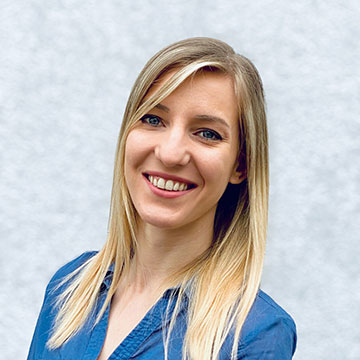
Milana Kendrisic
In the latest installment of Journeys in Optics, OPN spoke with Milana Kendrisic, a research fellow at the Harvard Medical School and Massachusetts General Hospital, USA, and the 2024-2025 Deutsch Fellowship recipient for her work advancing optical coherence tomography (OCT). She discussed how she chose a career in academia and the importance of collaboration.
How did you become involved with research on OCT, and particularly applications in biophotonics?
My involvement in OCT research happened by chance. I initially pursued my undergraduate studies at the University of Vienna, Austria, in electrical engineering. When I couldn’t find a master’s thesis project at the institute that I wanted to work on, the department directed me to collaborate with partners at the Medical University. Looking back, it turned out to be a fortunate turn of events, and my time at the Medical University of Vienna ended up being a truly transformative experience.
What excites you most about your work?
On a broader level, I’ve always felt that having a strong sense of purpose is key to staying motivated at work. Knowing that my efforts contribute to improving people's lives in the long run really gives my work meaning. On a day-to-day basis, I find great satisfaction in working with lasers and aligning optics. There's something reassuring about the fact that physics is consistent, no matter what.
Can you discuss the interdisciplinary nature of your research?
Addressing challenges in biology and medicine requires expertise not only in those areas but also in physics, chemistry, computer vision, informatics, AI and more.
Biophotonics is a prime example of an interdisciplinary field. Addressing challenges in biology and medicine requires expertise not only in those areas but also in physics, chemistry, computer vision, informatics, AI and more. While it's theoretically possible for one person to cover all of these disciplines, in practice, it's much more effective to have a team of people from diverse backgrounds collaborating. Each team member brings a unique perspective, which often leads to innovative solutions. For instance, many optical technologies used in medicine were originally developed for astronomy!
What do you hope to achieve during your time as a Deutsch Fellow?
The Deutsch Fellowship presented an exciting opportunity to work in an interdisciplinary setting at one of the leading biomedical research institutions. At the Tearney Lab at the Wellman Center for Photomedicine, everyone is eager to share their knowledge and support your project, all with the shared goal of better helping patients.
My project focuses on developing a unique device that resembles a pill but houses a fully battery-powered OCT imaging system inside. Our aim is to create noninvasive devices that can aid in more personalized treatment for patients with Crohn's disease. This approach could potentially allow for more frequent treatment monitoring, reducing the need for patients to undergo multiple endoscopic or colonoscopic procedures.
Why did you decide to pursue a career in academia?
I chose to pursue a career in academia primarily because of my curiosity. The freedom to explore new ideas is something that really appeals to me. Additionally, I find the passion and dedication that many academics bring to their research both motivating and inspiring.
Is there anything you wish you had done differently along your career path?
I soon realized that most of them told me they never had a set plan for where they ended up. Opportunities arise, and it’s about knowing when to seize them.
Looking back, I think I would have tried to worry less. Before finishing my Ph.D. I was determined to interview a lot of people I admired, both from academia and industry, to figure out how they made decisions in their careers. Like any scientist, I thought there must be a formula for making the best life choices. However, I soon realized that most of them told me they never had a set plan for where they ended up. Opportunities arise, and it’s about knowing when to seize them.
What advice would you give to students or other early-career researchers?
Always focus on what excites you! When you genuinely enjoy your work, success is much more likely to follow. Additionally, if you're working in clinical settings, it's important to develop your soft skills. You’ll need to adapt your communication style to different groups—whether it’s patients, clinical staff or engineers—since each group has its own “language.” This is why many successful people in our field are also excellent communicators.
Finally, I’d like to take this opportunity to remind everyone in the scientific community that, given the current state of the world, our work comes with significant responsibilities. As scientists, we should be the ones advocating for reason and using whatever influence we have to educate and engage with those around us. Publishing in scientific journals is important, but it’s not the reason we started our work. Let’s focus on making a meaningful impact and improving the world, one step at a time.
